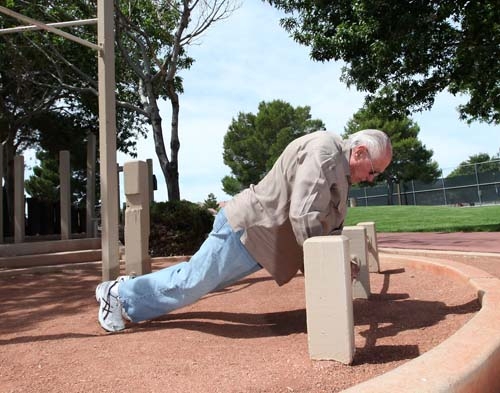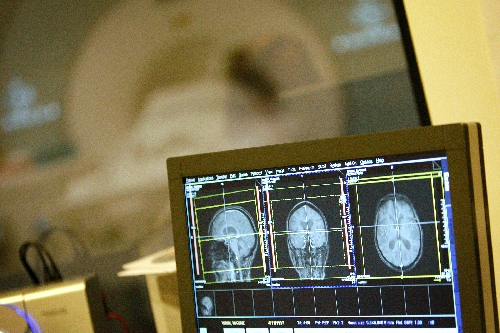Las Vegan, 85, supports clinical trials to thwart Alzheimer’s
It is mid-morning so gray-haired Richard Parker is doing what he usually does -- power walking five miles at Angel Park, stopping after each mile to do 25 pushups.
Nearby, a large mixed breed dog walking on someone else's leash is breathing harder than the 85-year-old Parker, who is readying himself for a second set of pushups.
"They tell me over at the Ruvo Center that exercise helps fight off Alzheimer's," he says, working his chewing gum with such vigor that a trip to the dentist seemed likely soon. "We all have to do what we can to fight it. You just can't sit back and hope you'll be OK."
Before he drove from northeast Las Vegas to the park, Parker warmed up both of his arms simultaneously by doing 200 curls with 10-pound dumbbells. He'd already read the newspaper cover to cover because he's well aware of research that shows you have a better chance of losing your mind if you don't use it.
And he took a pill for his occasional short-term memory problems. If the medication he takes three times a day works, it will either stop or slow down the progression of his disorder.
The pill has been part of a clinical trial at the Cleveland Clinic Lou Ruvo Center for Brain Health near downtown Las Vegas. It is one of 40 centers around the globe engaged in the latest research on Alzheimer's.
Alzheimer's disease continues to kill the brain cells of Americans at a staggering rate. Health officials say the number of Americans disabled by memory loss is expected to double to 16 million by 2050, costing taxpayers a whopping $20 trillion.
FACILITATING HOMEGROWN RESEARCH
Parker said he believes it is incumbent on everyone to do whatever possible to stave off a wretched condition that can even make going to the bathroom too much of a challenge.
"We have a center in this town doing research dedicated to stopping Alzheimer's," Parker said. "Why wouldn't people want to support it? You might help yourself and other people as well."
What Parker has to say is music to the ears of Dr. Jeffrey Cummings, director of the Ruvo Center and one of the world's leading researchers on Alzheimer's. He believes people are finally beginning to believe the studies that have shown a laid back, couch potato retirement might greatly contribute to loss of brain power.
And public participation in clinical trials dealing with the disease, he said, is more important then ever. New diagnostic tests on patients have made it possible for clinicians to see the build up of the protein in the brain believed to cause Alzheimer's.
"This is an unbelievable time in our research right now," he said, adding that other breakthroughs will occur faster as more people participate in trials.
Among the trials is one that studies people who might have the disease but show no symptoms.
"We want to see how people progress without treatment," Cummings said. "This study may help gain knowledge about how to prevent the disease."
Participation also is encouraged in two other local trials that involve inhibiting the destructive work of an amyloid protein, which many researchers believe has much to do with Alzheimer's. The testing includes such procedures as MRIs, spinal taps and lumbar punctures as well as memory testing.
Patient safety is always utmost in researchers' minds, Cummings said, noting that before humans become part of a study, key scientific standards must be met.
"I've never had any problems with the tests at all," Parker said. "My wife is the one who comes with me."
Studies of pills and vaccines, Cummings said, involve placebos for part of the study participants. Often participants, even those who were given the placebo, get use of the drug after the study is completed.
"These are trials that can make Las Vegas a leader in developing therapies for Alzheimer's disease," Cummings said.
A TRIP DOWN MEMORY LANE
Parker breaks down the trials to a distinctly human level.
As people get older, he said, they like to go down memory lane with friends, children, grandchildren and great grandchildren.
"I know I love to do that," he said.
He has a lot to talk about. He was a child actor and singer who worked with Mickey Rooney and Judy Garland in the movies. He trained to be an artilleryman during World War II but ended up entertaining troops with the Army.
He became a detective in Los Angeles and got shot in the stomach. After he recovered, he became a sheriff's deputy in Clark County and met mobster Bugsy Siegel, who opened The Flamingo in the 1940s.
He worked in security and as an administrator in several casinos, including Caesars Palace, before taking a job documenting materials at the Nevada Test Site. It was there, he said, that he suffered a back injury in the 1980s that caused him to endure several surgeries and forced him onto disability.
Recently, he was interviewed for the Larry King national TV special on Alzheimer's disease. He talked about how he was sure his active lifestyle slowed down the decline of his memory loss.
Last week, he was eager to once again talk about the subject.
"I'm not going to be a couch potato," he said. "There's no future in it."
He still has no trouble sharing his distant past, but he worries about his short-term memory. It started giving him trouble a couple years ago.
"My wife noticed that she had to repeat things that she had recently said to me," he said. "At first, I went to VA and got a pill for my memory. And then I went to the Ruvo Center. So far, so good.
"We need to use what they learn at that place as much as we can."
Contact reporter Paul Harasim at pharasim@reviewjournal.com or 702-387-2908.
PARTICIPATING IN CLINICAL TRIALS
Local participants are needed for many trials at the Cleveland Clinic Lou Ruvo Center for Brain Health in Las Vegas, according to Dr. Jeffrey Cummings, the center's director.
Among the trials needing participants are these three:
--The Alzheimer's Disease Neuroimaging Initiative examines people between the ages of 55 to 90 who are normal, those with mild cognitive impairment and those with Alzheimer's. People who engage in this 24-month observational study must be willing to undergo memory testing, sophisticated X-rays and one spinal tap.
--A three-year study is looking at a pill that is potentially a disease-modifying agent. Participants must be 45 years of age or older, have mild memory complaints, be willing to undergo a spinal tap three times during the study, an MRI at regular intervals, and have a study partner willing to be involved in the study and accompany the participant to each study visit.
--Another trial involves the 24-month study of a vaccine designed to alter the course of memory decline in patients with early Alzheimer's disease. Participants must be between 50 and 80 years of age or older, be willing to undergo memory testing, two lumbar punctures and sophisticated X-rays.
For information on these trials and others at the Ruvo Center, potential participants can call 702-483-6026.
LAS VEGAS-REVIEW-JOURNAL



















